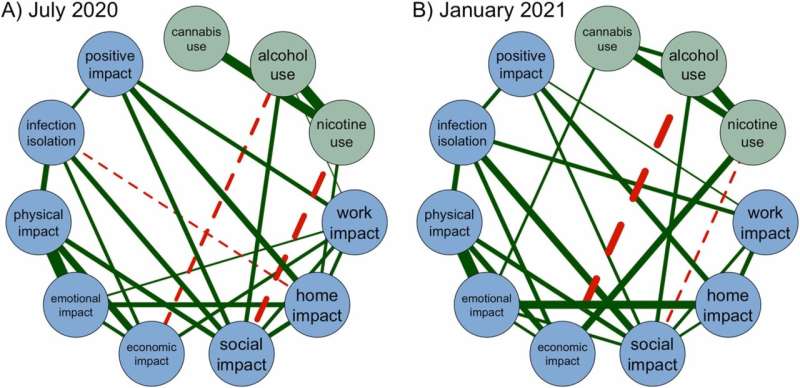This article has been reviewed according to Science X's editorial process and policies. Editors have highlighted the following attributes while ensuring the content's credibility:
fact-checked
peer-reviewed publication
trusted source
proofread
Hobbies and healthy habits surged during the pandemic: Study

Rather than turn to vices such as alcohol and drugs, many people turned to new pursuits to cope with pandemic-related stresses, according to a Rutgers study.
The study, published in the journal Drug and Alcohol Dependence, paints a more nuanced picture of how Americans adjusted to stay-at-home orders over the course of the pandemic.
"Reporting more types of negative experiences across work, home and social domains was associated with reporting more positive types of pandemic experiences, such as increasing physical activity and exercise, spending more time outdoors or engaging in hobbies, having time to cook to improve diet and nutrition, and spending more time with family and friends (even if virtually)," the researchers wrote.
This suggests that many individuals may have adapted to the negative pandemic impacts by adjusting behavioral lifestyle habits and engaging with social supporters.
To measure the effects of pandemic-related emotional, physical and economic stressors on substance use frequency, researchers at the Rutgers Center of Alcohol and Substance Use Studies examined data from the Caltech's COVID-Dynamic project.
As part of the COVID-Dynamic survey, participants were asked a series of questions about pandemic-related experiences, including physical and emotional health, employment, finances and family. They also were asked about their monthly substance use and whether the pandemic had any positive effects on their lives—such as increases in exercise or more attention to diet.
By examining data from two waves of the COVID-Dynamic project (July 2020 and January 2021), Rutgers researchers, working with colleagues from three other institutions at Kaiser Permanente and the City College of New York, determined how substance use was linked to pandemic-related experiences.
For instance, people reporting social and emotional impacts from the pandemic were more likely to use alcohol, while those reporting economic hardship were less likely to drink.
By contrast, nicotine use was higher among those reporting economic impacts and lower for people reporting significant social impact. Cannabis use was positively associated with emotional hardship.
Perhaps the most surprising finding was the dearth of substance use among the study participants, the researchers said.
"Overall, the amount of substance use in this sample was relatively low," said Denise Hien, Director of the Center of Alcohol and Substance Use Studies, a distinguished professor in the Rutgers Graduate School of Applied and Professional Psychology (GSAPP), and co-author of the study.
"We often think in terms of collective trauma, but this sample upends the idea that the pandemic was universally impactful," said Alexandria Bauer, an assistant research professor and a co-author of the study. Particularly for a normative population, "the data show there's a lot of nuances in how people experience these kind of mass events."
"While some data has shown that the use of drugs and alcohol increased during the COVID-19 pandemic, we found that many also coped during its darkest days by doing healthy activities like cooking, reading and gardening," said Margaret Swarbrick, associate director and professor, Center of Alcohol and Substance Use Studies in the Graduate School of Applied and Professional Psychology. "Engagement in health habits and hobbies appeared to increase to cope with the negative impacts of the pandemic, demonstrating that many were resilient."
"This study demonstrates GSAPP's ongoing commitment to conducting relevant, cutting-edge research for the common good," Arpana G. Inman, Dean and Distinguished Professor, Graduate School of Applied and Professional Psychology.
More information: Santiago Papini et al, Alcohol, cannabis, and nicotine use have distinct associations with COVID-19 pandemic-related experiences: An exploratory Bayesian network analysis across two timepoints, Drug and Alcohol Dependence (2023). DOI: 10.1016/j.drugalcdep.2023.109929




















